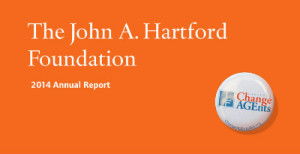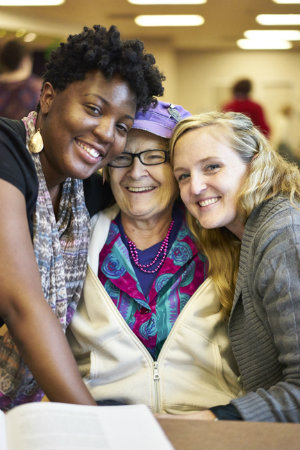 This is the second in a series of six Health AGEnda posts on the 2014 Annual Report.
This is the second in a series of six Health AGEnda posts on the 2014 Annual Report.Editor's Note: The John A. Hartford Foundation's 2014 Annual Report features five profiles of Hartford Change AGEnts whose work is representative of the kinds of practice and policy change the initiative is making. Read Harnessing the Power of Hartford Change AGEnts for more on the Change AGEnts Initiative. In the coming weeks, the Health AGEnda blog will spotlight the stories and videos of the other Hartford Change AGEnts profiled in the Annual Report. Today, we meet the co-chairs of the Hartford Change AGEnts Initiative Dementia Caregiving Network: Alan B. Stevens, PhD, and Nancy L. Wilson, LMSW.
The John A. Hartford Foundation's Change AGEnts Dementia Caregiving Network aims to serve as a bridge between evidence-based programs and care practices and people with dementia and their family caregivers.
Co-chaired by Alan B. Stevens, PhD, the Centennial Chair in Gerontology at Baylor Scott & White Health and professor at the Texas A&M University Health Science Center, and Nancy L. Wilson, LMSW, of the Baylor College of Medicine and the Center for Innovations in Quality, Effectiveness and Safety at the Michael E. DeBakey VA Medical Center, the network’s mission is to achieve improvements in services, supports, and care for those with dementia and their family caregivers.
The network, which has brought together a multi-sector, interdisciplinary team of leaders with expertise in practice, policy, and research related to caregiving and dementia, is one of the first two small, interprofessional workgroups created under the Hartford Change AGEnts Initiative to accelerate systemic practice change to address specific complex challenges in the care of older adults.
https://youtu.be/W1Hwl1xS6Nw
“We know the hardships of dementia caregiving and we know a great deal about what works to address the needs of caregivers,” Dr. Stevens says. “But we have a mismatch between caregivers’ needs, what they tell us they want, and a care delivery system that isn’t equipped to address their needs and desires. That’s why we envision the network as a conduit or bridge between how we provide care now and what caregivers are telling us they need and want.”
Wilson adds, “What the Dementia Caregiving Network allows us to do is to have a lot of the right people around the table discussing how we can put together what we know works in a way that might be more successfully used in different contexts.”
Members meet in person and over the phone to create a strategic agenda for practice change in different domains, including policy and health care delivery. They also collaborate closely with the other currently active Change AGEnts Network, which is focused on patient-centered medical homes, as well as with the initiative’s leadership team and broader community.
Taking Action
 As the Network works to achieve improvements in services, supports, and care for persons with dementia and their family caregivers, we envision advancing quality care in more settings like the Day Center of Sheltering Arms Senior Services, a division of Neighborhood Centers, Inc. in Houston, TX.
As the Network works to achieve improvements in services, supports, and care for persons with dementia and their family caregivers, we envision advancing quality care in more settings like the Day Center of Sheltering Arms Senior Services, a division of Neighborhood Centers, Inc. in Houston, TX.As a result of its discussions, the Dementia Caregiving Network has already launched two Action Projects to address topics considered critical to practice change.
One involves cataloging evidence-based approaches that address the needs of family caregivers by characteristics that are important to providers and payer organizations, as well as to family caregivers. The goal is to create “community-friendly” tools and evidence-informed materials, such as a searchable website, to help providers and family caregivers make decisions on which evidence-based programs and care practices to offer, pay for, and use.
The other Action Project involves working to embed reliable and culturally sensitive tools to assist in identifying family members at the initial stage of an older person’s dementia care so they can be linked to needed support services sooner. Some caregivers experience health risks that include high levels of stress, depression, neglect of personal health care, and substance abuse, among other problems. This Action Project will work to identify those caregivers who are at risk of negative outcomes while making sure that family caregivers have access to education and support services.
“Very often, the health of the caregiver is a determining factor if the loved one can remain in the home rather than institutional care,” says Dr. Stevens. “If the caregiver is healthy, emotionally and physically, and wants to continue in the caregiver role, then we should maximize their ability to do that because it’s the best thing for the caregiver and recipient and reduces the need for long-term care. It’s a win, win, win, all across the board.”
Wilson says she is optimistic that the diverse backgrounds and expertise of the Network members will result in developing solutions that work for many family caregivers in different situations.
“We have people working in a range of health care organizations with different financing models and different opportunities to apply what we’re working on,” she says. “That creates more opportunities to produce tools and models that may have value to different audiences, as opposed to just looking at something that’s a one-size-fits-all kind of approach.”
Read previous Health AGEnda posts on the 2014 John A. Hartford Foundation Annual Report:
Creating Change Every Day: The 2014 John A. Hartford Foundation Annual Report
